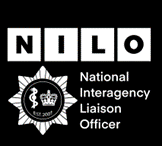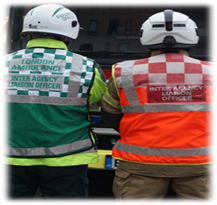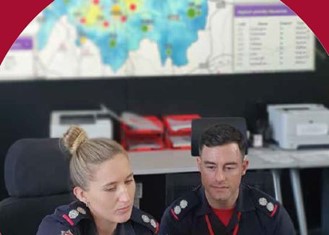National Inter-Agency Liaison Officer (NILO)
National Inter-Agency Liaison Officer (NILO)

Patrick Goulbourne – Assistant Commissioner of Operational Resilience and Control – London Fire Brigade
Inter-Agency Liaison Officers (ILOs) were established following Exercise Trump Card, a multi-agency CBRN exercise sponsored by the Home Office in 2000. A subsequent recommendation of this extensive multi-agency exercise was to improve liaison between agencies at multi-agency incidents, in particular at complex or protracted terrorist related events where protected information needs to be shared. The London Fire Brigade (LFB) subsequently developed the Inter-agency Liaison Officer (ILO) role in conjunction with the Metropolitan Police Service (MPS) Anti-Terrorist Branch SO13, now the Counter Terrorism Command SO15 in 2001. After the initial development, several other emergency services introduced ILOs within their own agencies and led to a national standard of NILO.
A NILO is a security vetted, trained and identifiable responder from the emergency services who is a tactical adviser but can assume a command role if required. They can operate at pre-planned or spontaneous operations with extensive knowledge of multi-agency capability, procedures and processes to enable operations at high threat and terrorist incidents.
NILOs can be found within the Fire & Rescue Services, Ambulance Services, British Transport Police, Police Scotland, Police Northern Ireland and His Majesty’s Coastguard and Military. Each agency has a National Coordinator and the Fire & Rescue Service assumes the role of Senior National Coordinator to ensure strategic coordination across agencies whilst also holding responsibility for the NILO Coordination Office (NCO) activity.
The NILO role delivers two main functions:
Proactive response: Intelligence-led operations where the blue light services’ pre-planning focus will be on risk reduction, risk and asset management and communication.
Reactive response and mobilising: Where the NILO can advise on an agency’s capacity and capability to complement those of other agencies to safely resolve an incident. There are four main categories of incident types in which the NILO may be involved:
- CBRN(e) and conventional terrorism, including Marauding Terrorism Attacks
- Major Incidents
- Complex or protracted police-led incidents
- Spontaneous and planned serious public order.
The role of the NILO will involve:
- Delivery of the Joint Emergency Services Interoperability Principles (JESIP)
- Supporting delivery of the four pillars of the CONTEST strategy
- Intelligence and information sharing between partner agencies
- Inter-agency planning, operational preparedness, liaison and response to incidents
- Co-operation and understanding amongst agencies on matters of organisational capacity, capability, command, policies and procedures
- Delivering tactical advice and intelligence when supporting strategic, tactical or operational commanders, supported by the creation of a documented emergency or deliberate action plan.
- Reduce risk to the public, operational personnel and the environment.
- Working within Operational and Event control rooms, Counter Terrorism Units (CTUs) and environments that are outside the normal scope of their host agency
- Supporting protective security arrangements

NILO Coordination Office (NCO)
The NCO is located at London Fire Brigade Headquarters and provides support to the National Coordinator to deliver all the relevant national functions. This includes secure communication and information systems to support NILO operations and the distribution of NILO Information notes. Funding is provided to each region to deliver annual multi-agency training events to support Continuous Professional Development. The NCO is responsible for the confirmation of NILO vetting status and supporting NILO Identification card distribution.
The NCO is responsible for emergency notifications to NILOs via Blackberry AtHoc should a terrorist incident occur in the UK. It is a secure crisis communication solution designed to help the NILO network quickly and effectively communicate critical information during emergencies, natural disasters and other major incidents. It is a cloud-based platform that enables the NILO Coordination Office to reach individuals and groups of NILOs via text, email and mobile app notifications and is fully auditable.
The NCO also hosts the annual NILO conference for all current NILO officers from all agencies as an opportunity to further their knowledge on relevant emergency policies, procedures and multi-agency working. These events have been attended by international experts in Counter Terrorism, Homeland Security and includes detailed inputs from key major and terrorist incidents that have taken place in recent years. They provide a valuable opportunity for the NILO cadre to network with each other and key experts in the field on Counter Terrorism, intelligence, rescue and response and become part of NILO officers continuous professional development. The last national CPD NILO event was held at the Emergency Services Show in Birmingham, attended by a range of speakers including Counter Terrorism Policing National Coordinator.
The NILO foundation course
The NILO foundation course is a nationally recognised, multi-agency training course developed in partnership with the National Fire Chiefs Council (NFCC), National Ambulance Resilience Unit (NARU) and the National Police Chiefs Council (NPCC) with over 1000 NILOs trained to date across the United Kingdom.
Delegates are assessed against National Occupational Standards (NOS), accredited by Skills for Justice. The two-week acquisition course comprises of a pre-course learning assignment, reflective sessions and simulation exercises, with a final written exam and certificates awarded by the Fire Service College at Moreton-in-Marsh.
The course is explicitly constructed to expose delegates to the UK’s leading experts in terrorism and their organisational roles and responsibilities, capacities and capabilities to respond. Delegates are given the opportunity to develop a common understanding of the relationships, planning and collective response to various terrorist and other malicious attacks, natural hazards, major accidents and other non-malicious attacks. It is also designed to bring commanders together into a single training environment working across aligned national operating procedures to better understand information, intelligence and capabilities to deliver effective joint working. The fundamental impact of this role for multi-agency communication and effective resolution of a vast range of incidents continues to be developed and embedded into all areas of emergency service delivery within the UK.

Current NILO developments
In early 2023 the team from NILO created the first National Control Liaison Officer (NCLO) in response to recommendations from the Manchester Arena Public Inquiry. The course is designed specifically for multi-agency control room staff to further enhance an interoperable response and reinforce JESIP principles. This course has created a cadre of NCLO officers who have control room specific training for high threat incidents, terrorism and major incidents. It delivers an enhanced level of understanding of the importance of the interface between Control Rooms and the NILO role at a multi-agency incident. It is held simultaneously with the NILO course enabling joint MTA exercising between both courses supporting aquisition learning.The NCLO course will be available throughout 2024 via the NCO.
NILO has been working with international partners to share information and learning from incidents. Recent sessions have included sharing the UK experiences from Operation London Bridge and the tragic Sandy Hook Elementary School shooting. NILO has also signed an agreement with the Royal United Services Institute (RUSI) to enhance CPD opportunities.
This year has also seen the first formal signing of a Memorandum of Understanding (MoU) between the Falkland Islands Government (FIG) and the London Fire Commissioner, providing NILO support to the Islands. It is the first British Overseas Territory to enter into this type of arrangement, in order to access NILO capabilities and also provide the Islands with wider access to UK support for emergency planning, preparedness and response.
NILO is an established and trusted element of interoperability working together delivering JESIP. Since its inception in 2001, the role has proved an essential element within the UK’s response and will continue to delivery a multi-agency response to protect our communities.